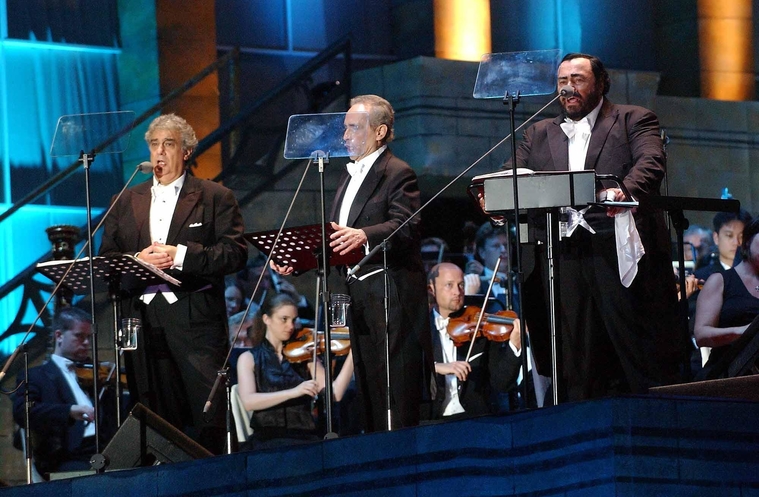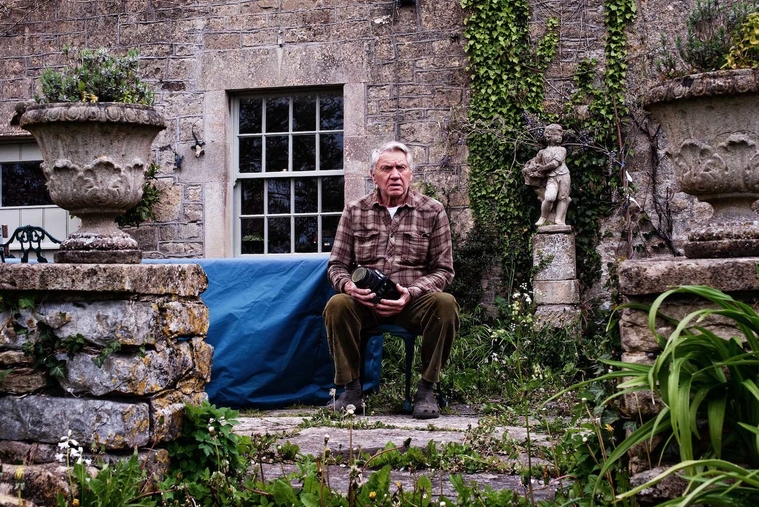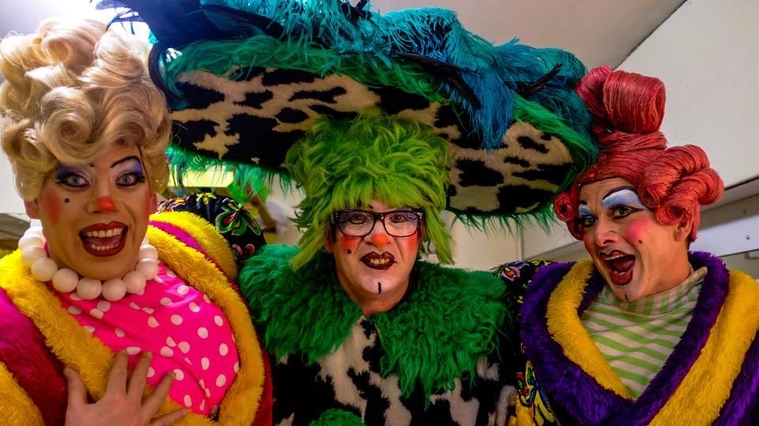When our annual dance event - Spring Forward - takes the centre stage in the March calendar, dancers from all around Somerset come together to celebrate the love of movement and artistic expression. At the heart of the show stands Len Copland, the talented photographer whose lens has immortalized the essence of this event year after year.
As the dancers float on and off stage, Len quietly works his magic, capturing not only the grace and strength of the performances, but also the smiles, camaraderie and joy that makes Spring Forward so special.
You can say Len is now our official Spring Forward photographer, and as we’re about to share his latest shots of this year’s event, we thought it was the perfect time to invite him in for an interview with our Director of Dance, Alison Lord. Read on to learn more about the man behind the lens.
It’s warm and sunny in our rural office in South Petherton, and the smell of coffee drifts in the air. Len arrives right on time, lovingly carrying his favourite camera. With his tall stature and contagious energy, he exudes an infectious enthusiasm that fuels his craft.
Serving him a steaming cup of coffee, complete with milk and without sugar, we settle into an engaging conversation, ready to get to know the man who’s left such an imprint on Spring Forward’s visual legacy.
Alison: Let’s start with an easy one. How did you get into being a professional photographer? What is your background?
Len: I needed to get off the Isle of Wight where I grew up - I found it very boring as a child in the 70s. So I joined the Navy and ended up at Yeovilton. When I came out, I drew cartoons and little illustrations, so I've got that background. But it all started when I was invited to a friend’s house, who was starting out as a photographer. He invited me to see his dark room, which he had set up in the house. It was a small room at the back, with boarded up windows and an enlarger.
This was back in the days when you had to develop film manually, and I saw this picture of a group of people just appear in the developing tray. And I thought that's it. That's exactly what I want to do. Within a week he set up a camera for me and asked me to go and photograph Paddy Ashdown, who was the MP at the time. I got on the front page of the local paper, and it just escalated from there. I've just been doing it ever since.
Alison: Amazing story, Len. So no formal training?
Len: No formal training. Back in the day, so many papers and TV stations existed even around here. Everything I've learned is just what I picked up from following all the photographers around. I let them do their bit first, find out what they did and then I copied it. Until one day when I went to St John’s Green I got in first. That's the sort of way I learned my trade. Then I did weddings and a lot of regional press stuff.
Alison: Where did your passion for theatre come from? What made you choose that niche?
Len: I’ve liked theatre since I was a child, I used to like Punch & Judy on the beach. Now I've said it before many times before, I can't sing, I can't dance, and I can't act. But I can take photographs and capture moments. I remember one of the first times I photographed professional dancers was in the Haynes Motor Museum. I don't know why but they had two ballet dancers there. And I remember at the time I had a new flash with a long lead and it was just wonderful. And I thought I want to photograph dancers because the awareness and control of their body, their grace, it’s beautiful. It's an aesthetic. It was a basic picture, but to me it was artwork. This was in 1991.

Alison: So over the years, you've done some impressive shooting, what's the most exciting thing you've ever worked on?
Len: Obviously, there's many, many, many. But one of my favourites was when I had to photograph Luciano Pavarotti and the three tenors in Bath. It was mind-blowing. Carrera came out right at the beginning, and the crowd went absolutely crazy. Then Domingo came out to the exact same big cheer, so loud it made your ears hurt. There's such adoration for these people. And when Pavarotti came out the crowd went wild. Never heard noise like that. I've got goose bumps on my legs just thinking about it. I had a photograph to take and I was utterly star-struck. There were only two or three times in my career when I was actually nervous about a shoot. That I could almost feel myself shaking and had to get my breathing right. This was one of them. David Bowie was another.
Alison: Wow you got to photograph David Bowie!
Len: Yeah, a couple of times. Once at Glastonbury and once in Exeter Westpoint believe it or not. That was quite good fun.
Alison: So you're now our official photographer for spring forward.
Len: It’s such an important event and different from all the others because it’s so varied. Older and younger dancers, even people that are not professional, you know, just doing it for the love of it.
Alison: Yeah, it's great that it’s also a completely free event. It's totally accessible because people can come and take part without having to pay anything apart from just getting themselves there. We have groups from all over the South West.
Len: And I bet they get so much out of it as well, because they're mixing with other dancers. I think there was even a disabled group once and I thought they were just amazing. It's so inspirational, isn't it?
Alison: Definitely! What we try to do is mix up the group to inspire the younger dancers to learn from the older dancers, the ones who've maybe been dancing a long time and are part of youth dance companies and things like that. Glad you’ve picked up on it!
So moving onto our next question, what tools or equipment can you not live without?
Len: Well, obviously my camera. So the basic is a camera body and a fast lens. You need a fast lens, with really fast shutter speeds. If you're photographing dancing, and they're jumping and spinning, you want to be able to shoot at the rate of 1/1000 of a second. But camera gear is expensive and nowadays you can get a good result even from your phone. But the more you get into it, the more stuff you need.
Earlier in the week I was up at Ham Hill photographing a dancer called Paige Travers. It was a beautiful sunset and I used stand up lights. She was backlit by the sun, which means without extra lights there'll only be silhouettes. Those can look lovely too. So yes, you can get away with a basic camera, a fast lens, a reflector and, you know, a couple of little nightstands but you have to carry it from the car, which is the ball.

Alison: Ever thought about teaching master classes?
Len: I've just started funnily enough, back at Yeovil College, I give workshops, masterclasses if you like. I show them how I do it, which is not necessarily the right way. It's one way that works for me. And I'm thoroughly enjoying that, even though they might just go out and take my job for me afterwards! (laughs) But I think there's plenty of room out there for everybody.
Alison: What software do you use for post processing?
Len: Well, first thing I do when I get home from any shoot is getting the pictures off the camera and onto my iMac. I also put it onto an external hard drive for back up. Then I use Photo Mechanic to just pre-edit my photos, mark the ones I like and add notes if needed. After that I use either Lightroom, Photoshop or Adobe Elements to fine tune them.
Alison: Do you go to bed at night and dream photography?
Len: Yes, sometimes I even wake up with a good idea and I write it down, because otherwise I will forget it. I like taking notes. But you get a lot of ideas while driving so I often think okay, I've got to remember that. That is a picture I want.
Alison: What camera do you use now?
Len: I used to have a Nikon D850, which is a single lens reflex digital camera. What I have here is a mirrorless Nikon Z6 II. So the view you get when you look through the viewfinder is actually generated, because there's no mirror and there's no shutter inside either. There's no real noise when you shoot. This camera is about £2000-£2500 but the new one that's just come out is almost £4000. It's just crazy, crazy money, and then of course you need the lenses on top. But you get what you pay for. It's as simple as that.
Alison: So do you prefer Nikon or Canon?
Len: Nikon, as I’ve always mostly used Nikon. No other reason. In fact if I wanted a change I’d probably go for Fuji, as I really like Fuji. I’ve a couple of those as I’ve kept every single camera I had. Some of my friends like looking for old camera lenses at car boot sales. You can get them cheap, and you can get adaptors now to fit in onto almost any camera and get those vintage effects. It’s just crazy what you can do.
Alison: Is there an event or concept that you haven't photographed yet, but you'd love to?
Len: I'd love to photograph in the Royal Ballet School in London. I’d love to be invited to do one of the rehearsals and take one of our local dancers to be part of the ensemble. Or do one of the big musicals at Leicester Square. Especially if there was somebody there from Somerset that could inspire some of the people that are still down here. It would help encourage them, to see what’s possible if you put your effort into it.
Alison: What do you do when you're not out there taking pictures?
Len: I always take pictures. Honestly, I just go for walks. For example every time I go into Yeovil I photograph the town centre, because everything is constantly changing. I like recording this as it’s such an organic process. I like photographing chimneys; you can get really creative.
Alison: Do you always have your camera with you?
Len: Pretty much always yeah, I've got my big cameras with me.
Alison: What was your first ever camera, do you remember?
Len: my first camera was given to me by the guy I started working in the very beginning, Eugene Taglione, it was a Nikon FM 2. I had a little zoom lens on it, which was a 24 - 70mm, and a flash gun with what we called a hammerhead. It’s the one you can tilt up and down. And that was pretty much it. When I first started using it, the camera was set up for me. These cameras are manual, and they’re film cameras, so you have to understand how they work, and how to read the light.
I do workshops at Yeovil College and they have a good procedure as they start everyone on film cameras. So they have to learn the basics. You can't just put it on auto and get away with it. You have to understand why things work, it will help you down the line. If you don’t know why your settings work the way they work, you’re never going to learn.
Alison: I love hearing the stories from photographers where they will literally spend hours in one spot, just trying to get the right light, or, you know, waiting for that bird to come along. The dedication is just amazing.
Len: I go back to some events, year on year, because I know there's a picture there. I went to a kite festival many years ago and I’d kept going back for five years only to get this picture, which I didn't even know what it was. And in the end, I got it. One of my favourites. It was a little boy jumping up in the air, trying to catch the little kites that were disappearing into the sky.
I also go every year to photograph the Morris dancers on Ham Hill. I go because I know there's a really good picture to be had. And I've got a couple of good ones that were in the Times and other national newspapers, but I still haven’t got the picture I want. I’m still working on that one.
Alison: Who's your favourite photographer?
Len: Don McCullin, he is a war photographer. He lives in Wincanton, he’s just fabulous. He’s worked in Vietnam and all over Africa. I got to photograph him a couple of years ago, I had to go to his house. I photographed him outside taking a roll of film out of his camera. We were doing a story about a building in the village, which was an eyesore. He took a picture of it and he was giving it to me. That's basically why I was there. So he gave me this roll of film to develop. We filmed the whole process and he let me keep the negatives. I got the negatives of Don McCullin, one of the most famous films in the world! It was quite cool.

Alison: So what do you recommend for someone who's just starting out?
Len: Well, just enjoy your photography, don't worry about what you what you're photographing at the moment. Learn and read a guidebook or manual, don't just take pictures, find out how your camera works, at least just the basics. It will save you a lot of trouble down the line.
Be proactive, that was a big one for me. I didn't have any formal training at all. I wish I had because I would have saved a lot of time. This is why I teach at Yeovil College, to save these kids time. It's hard work and it’ll take time to find your niche and go with it. I've been doing this for nearly 40 years and I'm just finding mine now.
Alison: If you could photograph any dancer, who would it be?
Len: I’d have loved to photograph Darcey Bussell when she was still dancing. She’s just so lovely. I just love dancing, the way they move is almost like poetry, isn't it? To me this is the thing of beauty. I don't really mind who it is as long as they can do it. I'm learning more about contemporary dance now through events like Spring Forward. I'm not used to photographing contemporary dancers but now I'm trying to do more of it and I really like it.
Alison: Len, thank you so much for coming in and sharing your story. You caught some absolutely beautiful images from Spring Forward, we can’t wait to share them.
Len: Thank you, it was my pleasure.
